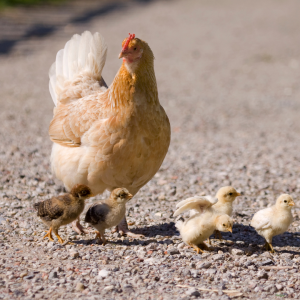One of the best parts about raising chickens is the cute baby chick stage. Fluffy, sweet chicks are part of the reason many people decide to get chickens in the first place. If you’re raising chickens, you may have noticed a hen that spends more time than the other hens in the nesting box. If so, you likely have a broody hen. Let’s talk about what to look for in a hen to see if she can raise chicks successfully.

What does ‘broody’ mean?
The term broody is used to describe a hen that willingly sits on her eggs in attempt to hatch chicks. Not all hens will be broody. Some breeds tend to be more broody than others, but even in broody breeds, not all hens will attempt to sit on eggs. A broody hen will sit on a clutch of eggs day and night in attempt to hatch them.
Here are some signs that your hen is broody:
- She refuses to leave the nest. She will sit on a clutch of eggs day and night and only leaves for a few short minutes to get a small bite to eat and a quick drink.
- She may peck at you if you try to get eggs out of the nesting box. Once she sets her mind on hatching those eggs, she will try to defend them, even from you.
- She may be missing chest feathers. A broody hen’s job is to warm the eggs and keep them at the ideal moisture level. She may pluck out her chest feathers to get direct skin to egg contact, providing more warmth and moisture to the eggs.
- A broody hen may only poop once or twice a day. Poop around the eggs can be dangerous since poop contains bacteria. She will hold it while she’s on the nest and will wait until she gets up to relieve herself. Broody poop is very large and smelly as a result of her holding it in.
- She won’t eat or drink much. Most chickens eat all day long. A broody hen will only eat for a few minutes a day since she’s so focused on hatching eggs.
- Broody hens can get really flat in the nest. They can spread their body out across a large clutch of eggs.
You may notice a hen that tries to sit on eggs when there’s only a few. Some hens will even sit in an empty nest. If you notice this, you’ve got a broody hen.
Caring for a Broody Hen
Some hens are natural mothers, while others aren’t as dedicated. So how can you tell the difference?
A good broody hen will be very dedicated to her job. She will rarely leave the nest and won’t allow other hens to sit on the eggs with her. Once she claims a clutch of eggs, it’s her job alone to hatch them. Some hens that aren’t as dedicated may try to co-brood. This usually doesn’t work out well. If you’re wanting to hatch chicks and you see two hens sitting on the same clutch of eggs, you might want to divide them up.
Any time that a new hen is brooding, keep an eye on her and the eggs. If you notice other hens trying to get into her nesting box or trying to take her eggs, you’ll want to separate them from the rest of the flock. A dog kennel of small crate is a perfect size for a broody hen. When the eggs hatch, make sure that the hen is caring for them. If not, you can move them into a brooder.
One of the most rewarding parts of having chickens is watching a mother hen wander around with her chicks, showing them how to look for food and water. If you haven’t let your broody hen hatch chicks yet, there’s no better time!